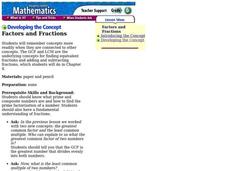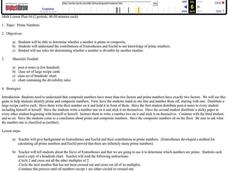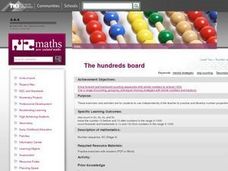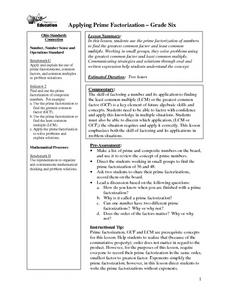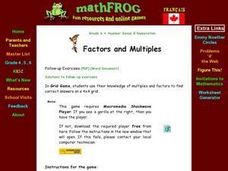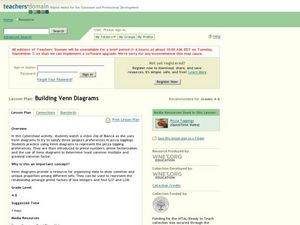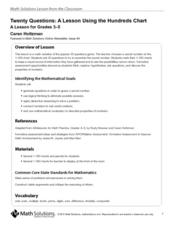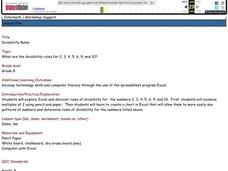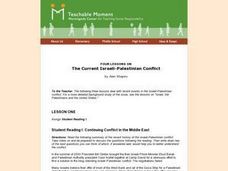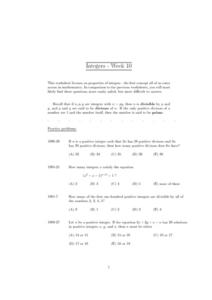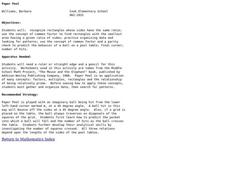Curated OER
Factors and Fractions
Find the greatest common factor of numbers. Learners review prime and composite numbers and how to find the prime factorization of a number. They also review the greatest common factor, least common multiple, and learn new ways to find...
Curated OER
Prime Numbers
Students differentiate between prime and composite numbers. For this algebra lesson, students define the terminology and investigate the contributions made by Eratosthenes and Euclid as it relates to prime numbers. Students apply the...
Curated OER
Prime and Composite Numbers
Sixth graders identify prime and composite numbers. They participate in a hands-on activity to discover the multiples and factors of specified numbers. They write a paragraph to explain representing factors.
Curated OER
Prime and Composite Numbers
Sixth graders inspect prime and composite numbers. Using graph paper, they draw as many different shaped rectangles as possible. They use the dimensions of the rectangles to discuss prime and composite numbers. Students create a chart...
West Contra Costa Unified School District
Simplifying Radicals – Day 1
It doesn't get simpler than this. Scholars first learn to simplify radicals by determining the prime factors of the radicand. The lesson progresses to simplifying radicals involving algebraic expressions in the radicand.
Curated OER
The Hundreds Board
Students explore the concept of multiples and use a hundreds board to add numbers and then graph them. Afterward, they use the sieve of Eratosthenes to identify prime numbers and discover how numbers change when you add or subtract by ten.
Curated OER
Applying Prime Factorization
Sixth graders use the prime factorization of numbers to find the greatest common factor and least common multiple. Working in small groups, they solve problems using the greatest common factor and least common multiple.
Curated OER
Factors and Multiples
Sixth graders need to see the relevance in the mathematics they learn. This lesson builds on the concepts of least common multiple and greatest common factor. The lesson presents real-world problem situations for students to solve.
Curated OER
Building Venn Diagrams
Students use Venn diagrams to solve prime number and factorization problems. In this multiplication lesson, students watch a video and use a Venn Diagram to help them solve a pizza math activity that uses prime factorization. Students...
Curated OER
Investigation-Design Your Own Spinner
Students design their own spinner that meets the given criteria. In this math lesson, students discuss biased versus unbiased events or outcomes when dealing with probability. Students are given 5 criteria that must be incorporated into...
Curated OER
Factors, Divisibility, and Relatively Prime
Seventh graders explore the concept of divisibility. In this divisibility lesson, 7th graders use divisibility rules to find factors of numbers. Students create foldables to illustrate divisibility rules.
Curated OER
Twenty Questions: The Hundred Chart
Use the 20 Questions game to practice math vocabulary and number properties! Project a hundreds chart and hand one out to learners. Ideally, give them counters (beans would work well) to mark off the chart so you can play multiple times....
Curated OER
Divisibility Rules
Eighth graders explore Excel and discover rules of divisibility for the numbers 2, 3, 4, 5, 6, 9, and 10; students examine multiples of 2 using pencil/ paper, then create a chart in Excel that will allow them to more easily see patterns...
Curated OER
Pascal's Triangle
Young scholars explore the concept of Pascal's Triangle. In this Pascal's Triangle lesson, students use an applet called 'Coloring Multiples' to explore Pascal's Triangle. Young scholars develop patterns starting with various numbers in...
Curated OER
Good Book, Bad Book: Lesson 2
An interesting way to incorporate pop culture and the elements that make a book good. Kids watch a clip from MTV Cribs, they discuss how good or bad books are similar to good or bad homes. They are all different and not everybody will...
Virginia Department of Education
Rotation
Rotate this resource into your lesson plans. Scholars rotate polygons in the coordinate plane by multiples of 90 degrees. They then compare the original and new figures to develop conjectures about coordinate points after rotations.
Curated OER
The Current Israeli-Palestinian Conflict
Examine recent events in the Israeli-Palestinian conflict. Three lessons, multiple excerpts, evaluation questions, and activities are all included to make your class globally aware.
Curated OER
Quickies Final Hints And Answers
In this math worksheet, students examine the numbers while looking for the number patterns. They determine the values of the missing variables.
Curated OER
Pascal's Triangle
Students study Pascal's triangle. They construct their own version of Pascal's triangle, and relate some of the uses for it. While working through this process, students practice their integer multiplication and division skills.
Curated OER
Integers - Week 10
In this integer worksheet, students identify the number of positive divisors in a given function, determine the number of integers that satisfy an equation, and solve equations with exponents. This two-page worksheet contains nine...
Curated OER
Factoring
Ninth graders factor equations and find prime numbers. In this algebra lesson, 9th graders find the factors and prime factors of a number using multiples and relatively prime numbers.
Curated OER
The Five Number Game
Students explain what it means to square numbers. They explain what it means to cube numbers. Students define prime numbers using their own language. They are introduced to the problem by playing one game as a class.
Willow Tree
Transformations
How does something go from here to there? Describe it with a transformation. Young mathematicians learn how to translate, reflect, rotate, and dilate an image.
Curated OER
Paper Pool
Learners analyze the measurements of rectangles. In this analysis lesson, students will investigate patterns by looking at ratios. Learners will also hypothesize the probability of a ball going into a certain pocket when playing pool....
